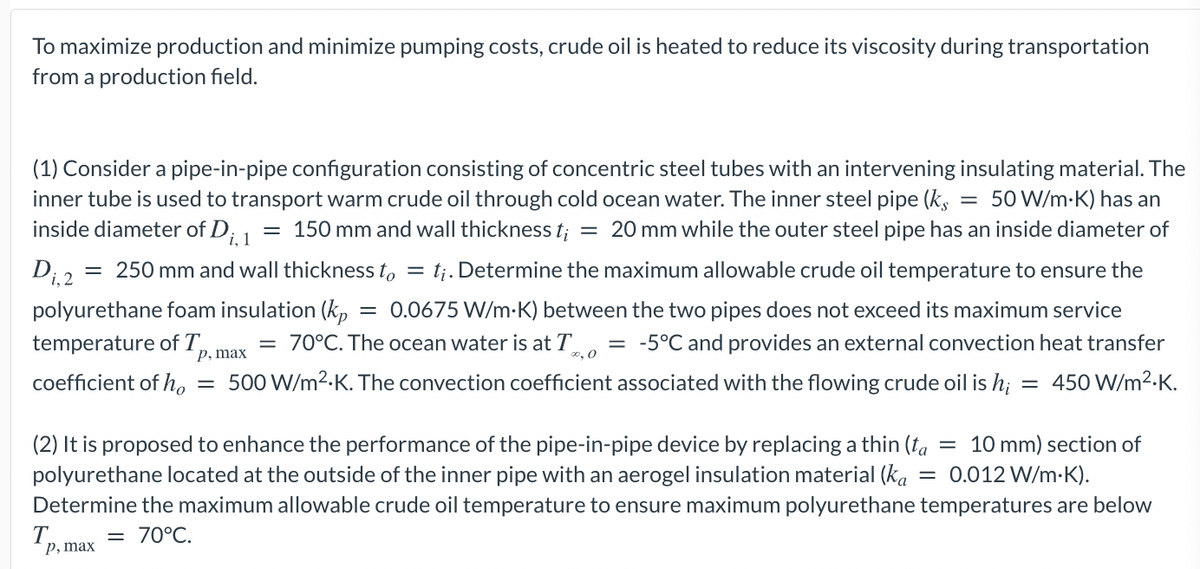To maximize production and minimize pumping costs, crude oil is heated to reduce its viscosity during transportation from a production field. (1) Consider a pipe-in-pipe configuration consisting of concentric steel tubes with an intervening insulating material. The inner tube is used to transport warm crude oil through cold ocean water. The inner steel pipe (ks inside diameter of Di 1 50 W/m-K) has an = 150 mm and wall thickness t; = 20 mm while the outer steel pipe has an inside diameter of = 250 mm and wall thickness to = t¡. Determine the maximum allowable crude oil temperature to ensure the Di,2 polyurethane foam insulation (kp temperature of T, 0.0675 W/m-K) between the two pipes does not exceed its maximum service = 70°C. The ocean water is at T *, 0 = -5°C and provides an external convection heat transfer P, max coefficient of ho = 500 W/m².K. The convection coefficient associated with the flowing crude oil is h 450 W/m2-K. (2) It is proposed to enhance the performance of the pipe-in-pipe device by replacing a thin (ta = 10 mm) section of polyurethane located at the outside of the inner pipe with an aerogel insulation material (ka = 0.012 W/m-K). Determine the maximum allowable crude oil temperature to ensure maximum polyurethane temperatures are below Tp, max 70°C.
To maximize production and minimize pumping costs, crude oil is heated to reduce its viscosity during transportation from a production field. (1) Consider a pipe-in-pipe configuration consisting of concentric steel tubes with an intervening insulating material. The inner tube is used to transport warm crude oil through cold ocean water. The inner steel pipe (ks inside diameter of Di 1 50 W/m-K) has an = 150 mm and wall thickness t; = 20 mm while the outer steel pipe has an inside diameter of = 250 mm and wall thickness to = t¡. Determine the maximum allowable crude oil temperature to ensure the Di,2 polyurethane foam insulation (kp temperature of T, 0.0675 W/m-K) between the two pipes does not exceed its maximum service = 70°C. The ocean water is at T *, 0 = -5°C and provides an external convection heat transfer P, max coefficient of ho = 500 W/m².K. The convection coefficient associated with the flowing crude oil is h 450 W/m2-K. (2) It is proposed to enhance the performance of the pipe-in-pipe device by replacing a thin (ta = 10 mm) section of polyurethane located at the outside of the inner pipe with an aerogel insulation material (ka = 0.012 W/m-K). Determine the maximum allowable crude oil temperature to ensure maximum polyurethane temperatures are below Tp, max 70°C.
Principles of Heat Transfer (Activate Learning with these NEW titles from Engineering!)
8th Edition
ISBN:9781305387102
Author:Kreith, Frank; Manglik, Raj M.
Publisher:Kreith, Frank; Manglik, Raj M.
Chapter7: Forced Convection Inside Tubes And Ducts
Section: Chapter Questions
Problem 7.53P
Related questions
Question

Transcribed Image Text:To maximize production and minimize pumping costs, crude oil is heated to reduce its viscosity during transportation
from a production field.
(1) Consider a pipe-in-pipe configuration consisting of concentric steel tubes with an intervening insulating material. The
inner tube is used to transport warm crude oil through cold ocean water. The inner steel pipe (k,
inside diameter of Di 1
50 W/m-K) has an
= 150 mm and wall thickness t; = 20 mm while the outer steel pipe has an inside diameter of
= 250 mm and wall thickness to = t¡. Determine the maximum allowable crude oil temperature to ensure the
Di, 2
polyurethane foam insulation (kp
temperature of T,
0.0675 W/m-K) between the two pipes does not exceed its maximum service
= 70°C. The ocean water is at T
o, 0
= -5°C and provides an external convection heat transfer
р, таx
coefficient of ho
= 500 W/m2.K. The convection coefficient associated with the flowing crude oil is h; =
450 W/m2-K.
(2) It is proposed to enhance the performance of the pipe-in-pipe device by replacing a thin (fa
polyurethane located at the outside of the inner pipe with an aerogel insulation material (ka
= 10 mm) section of
= 0.012 W/m-K).
Determine the maximum allowable crude oil temperature to ensure maximum polyurethane temperatures are below
T.
p, max
= 70°C.
Expert Solution
This question has been solved!
Explore an expertly crafted, step-by-step solution for a thorough understanding of key concepts.
This is a popular solution!
Trending now
This is a popular solution!
Step by step
Solved in 3 steps with 9 images

Knowledge Booster
Learn more about
Need a deep-dive on the concept behind this application? Look no further. Learn more about this topic, mechanical-engineering and related others by exploring similar questions and additional content below.Recommended textbooks for you

Principles of Heat Transfer (Activate Learning wi…
Mechanical Engineering
ISBN:
9781305387102
Author:
Kreith, Frank; Manglik, Raj M.
Publisher:
Cengage Learning

Principles of Heat Transfer (Activate Learning wi…
Mechanical Engineering
ISBN:
9781305387102
Author:
Kreith, Frank; Manglik, Raj M.
Publisher:
Cengage Learning